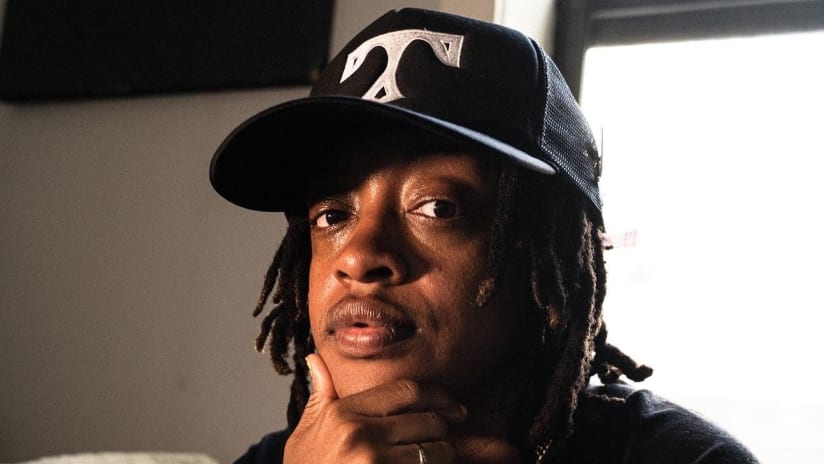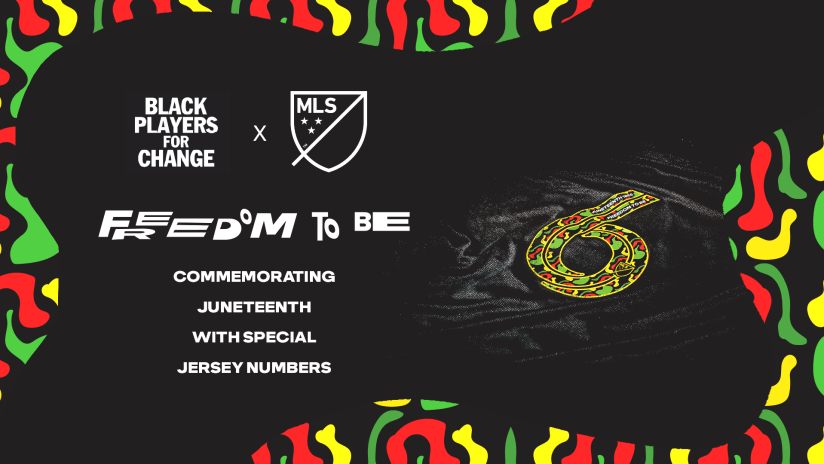Judah sees herself as an artist in the trenches. A graphic designer working hard behind the scenes to make others look good.
This weekend though, Judah will spend some time in the spotlight. At least her work will. She’ll take center stage in MLS Week 15 games across the country, whether the folks watching know it or not. As MLS recognizes and celebrates Juneteenth, its players will do the same while carrying Judah’s art on their backs. And if they’re carrying her art, they’re carrying her story too.
In recognition of Juneteenth, the day in 1865 when Texas’ enslaved people were finally informed of their freedom more than two years after the Emancipation Proclamation, MLS players will be wearing Judah’s hand-designed jersey numbers. It’s the second year in a row that MLS, in collaboration with Black Players for Change, has recognized the holiday with special jerseys that will be delivered to players in a commemorative box, also designed by Judah. Like with Israel Solomon’s art last year, each decision of color and shape has been deliberately and thoughtfully made. And each deliberation and thought has been shaped by Judah’s personal artistic journey.
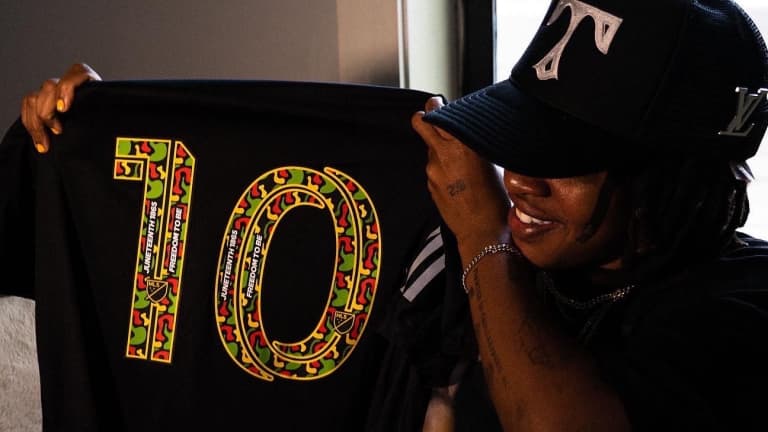
Judah grew up in Childersburg, Alabama. A little closer to Talledega Superspeedway than Birmingham. A population of about 4,900.
She found her calling in copies of Teen Vogue and SLAM magazines picked up in the Piggly Wiggly checkout line as a teenager. Judah devoted herself to graphic design, left Childersburg for Auburn University and, eventually, for the Northeast, where she’s since done work for ESPN, Andscape and Fanatics, among others. All notable projects but not necessarily outlets for personal expression. There’s a box you have to stay in.
In 2020, Judah decided the box wasn’t worth keeping around.
“I found out about Breonna Taylor and she's from a Southern state," Judah said. "Kentucky and Alabama are very similar. I have cousins that go to Kentucky all the time. That changed my life. It made me look at art in a different way, because I had always been chasing art as like this dream of trying to climb this ladder of success. Here I am from the outside seeming very successful, but on the inside, feeling helpless. I can't bring my family with me and have them in a place that's a little bit more safer than Alabama. I had two friends that lost their lives from just simple traffic stops with the cops in my town. For me, it was some feelings of guilt. Some feelings of there has to be more for me to do. Feelings of being defeated. And so 2020 is when I kind of stepped back from work and like the corporate environment a lot and, and really started to focus very heavily on family and friends.
“I kind of really started to be more connected to my roots, to my community, to my people, find ways to invest back into being Black and into the things that the Black people around me were doing versus just doing things that are very commercialized. I think it just really made me step into my Blackness more. So I just literally got rid of the box and just started to create what flowed to me, even if other people might have thought it wasn't traditional design. But because I did have that traditional design background, my design created a balance. I was able to take the very much untraditional, organic, kind of wild design, but also find a way to create some type of balance and peace within it.”
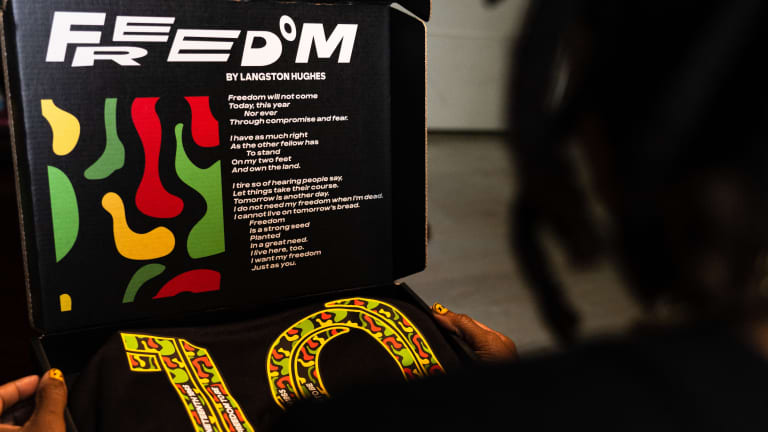
As Judah began to fully embrace her Blackness, she also began to embrace her queerness. Growing up in a religious family made that difficult. However, Judah decided that, like with her Blackness, the right people would be with her as she presented a truer version of herself.
“It was something that I was afraid of, because again, it just added another layer of everything about me," Judah said. "A lot of people that I was having to be around did not like it, which is why I was afraid to come out. So I think it made me aware that some people in this world just aren't gonna like you because they are so afraid of the unknown. But something I learned is that life is too short to live for other people. Like I've had people I know lose their lives because they were afraid to come out or come out and fully be Black.
“Honestly, just me coming out, being fully Black, me talking with my Alabama twang, I lost a lot of people. But I also gained people that I know are gonna be with me no matter what, up and down.”
Judah has taken her authentic self and has begun injecting it into her art. You can see it on her website and her Instagram and in her music and her streetwear brand, appropriately named “Trenches.”
And you can see it in her design for Black Players for Change and MLS’ Juneteenth recognition. It took Judah a moment to decide on how best to embody Juneteenth and the Black experience through shape and color. But in the end, she was able to find the connection she needed to convey herself, her friends, her family and her ancestry through black, yellow, red and green.
“Starting this project, I did not want to use red, yellow and green. Like I was so against it as a Black person that is African-American from Alabama. I have friends that are Haitian, friends that are Nigerian, and red, yellow, green, the colors of their flags, those colors have such a deep meaning. Those are not colors that I grew up on as an African American or somebody I grew up with in Alabama. And I have seen a lot of corporate companies use those colors as far as like grouping Black people in this one circle to say we're all the same. My ancestors probably came from some of those countries. But as far as like what I grew up on and, and my personal experiences, those colors were not colors that identify me,” Judah said.
“But as I started to walk through the project, I did start to understand. Those colors started to connect in a way for me. Red is connected to bloodshed, to my family, to the passion. Then you think about green and right now I feel like we're in a period of a lot of growth. And then yellow is a color of the sun, which means happiness. Together, those colors started to make sense for me. So if you look at the boxes, the main color is black. Black is the color that I know if I see something that's black, that's connected to me. That's the color that resonates with me the most. But because I have lived in Connecticut, I lived in Brooklyn, I lived in Texas, I lived in Alabama, because I have friends all over the world, I started to draw shapes that represented the different people that I met. Different lands of where they come from and they all start to connect.”
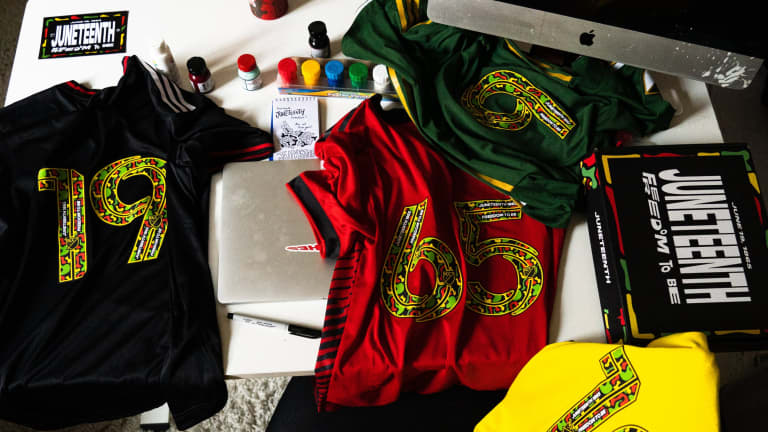
Both the jerseys and the Judah-designed boxes they come in can be bid on in a charity auction, the proceeds of which will benefit organizations supporting and uplifting Black communities in the markets of MLS clubs. Taking those funds and giving them back to the Black community is part of a Juneteenth trend Judah hopes will continue. Because if it just becomes another holiday without action, then all that work in the trenches starts to mean a little less.
“I don't want Juneteenth to turn into this holiday that's just a holiday," Judah said. "For me, Juneteenth is not like a holiday holiday. It's like ‘Oh my gosh, these people were still being treated as slaves and nobody told them?' So Juneteenth for me is more about like educating ourselves because it's like, well, what else don't we know? I don't want Juneteenth to become this holiday that we forget about.
“You have situations where companies are making money off of Juneteenth, but it's like, are we actually doing things to help? Black people have an opportunity for ownership, have opportunity to change, have opportunities for better lives for reparations. For many Juneteenth is a wake-up call to say, well, what else don't we know? I don't want to celebrate Juneteenth and forget that this country has inequalities.”


